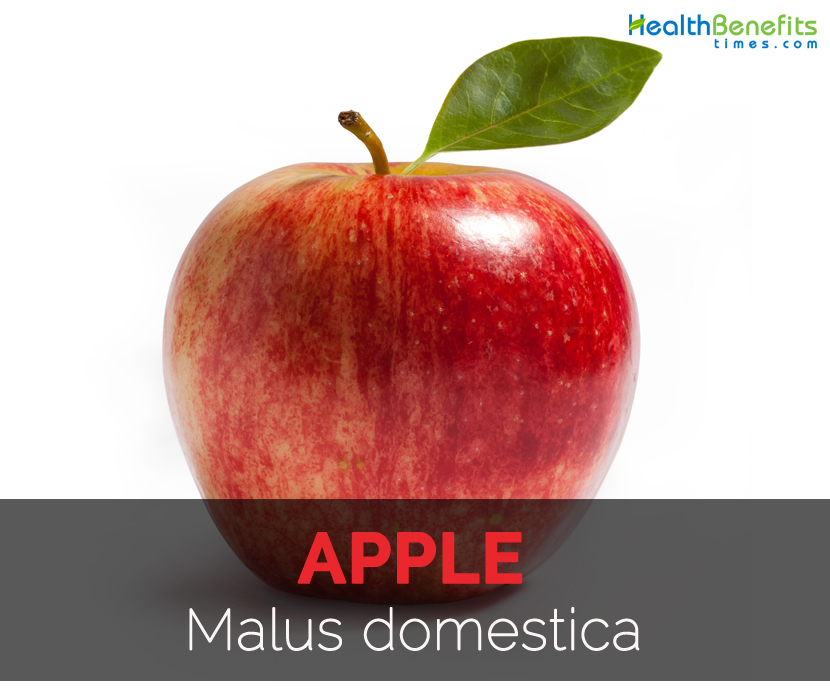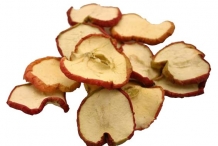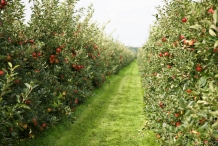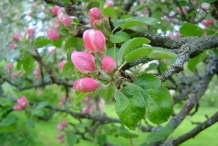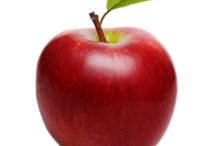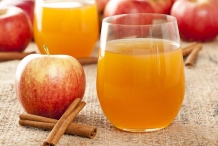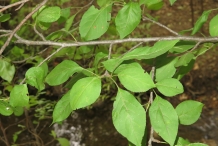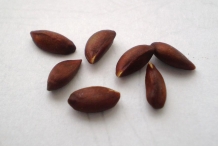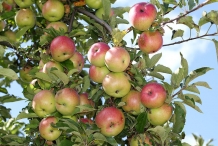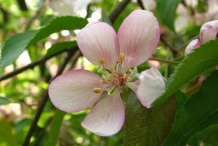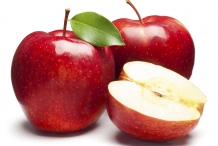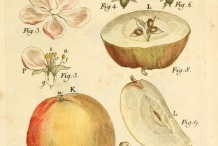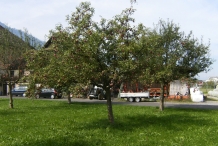It is also referred as Apple tree, Cultivated apple, Orchard Apple and Table apple. Apples are also known as nutritional powerhouse as it is associated with better health and prevention of various diseases. Vitamins found in apples helps to maintain red blood cells and nervous system. The fruit is free of fat, cholesterol and sodium and contains low amount of calories. Various vitamins and minerals such as folate, potassium, niacin, and Vitamin C, B, K and E are present in this fruit. Moreover, being a nutritional powerhouse, it prevents the chances of developing Parkinson’s and Alzheimer’s disease.
The fruit possess citric, malic, succinic and lactic acid, pectins, caffeic acid derivatives, vitamins and minerals. Apples have high content of flavonoids, antioxidants and dietary fiber. Polyphenols such as catechins, flavonols, chlorogenic acid, anthocyanins and phloridizin are standout nutrients in this fruit. Being a great source of fiber, it includes both insoluble and soluble pectins.
History
Apple tree was an earliest tree to be cultivated and its fruits have been used for over thousands of years. Dwarfed apples are found by Alexander the Great in 328 BCE in Kazakhstan. Those which he brought back have been forebear of dwarfing root stocks. In Asia and Europe, winter apples were picked in late autumn and were stored just above freezing which have been used as a vital food.
In 17th century, apples were brought by colonists to North America. On North American continent, first apple orchard was planted by Reverend William Blaxton in Boston in 1625. Crab apples also called as common apples were native to North America. The seed which was brought from Europe were spread as apple varieties along North American trade routes and also cultivated on Colonial farms. By the early 19th century, new North American varieties were introduced.
Till 20th century, apples were stored by farmers in frostproof cellars at the time of winter for sale or own use. An improve in transportation by road and train replaced the importance of storage of apples. In 21st century, long term storage get popularity as controlled atmosphere facilities were used to keep the apples fresh. The facilities of controlled atmosphere use low oxygen & carbondioxide levels and high humidity in order to maintain freshness of fruit.
Plant
Apple is a deciduous tree that stands from 6 to 15 ft (1.8-4.6 m) tall in cultivation. The tree has scaly and brown bark having the trunk diameter of 24 inches. The plant prefers well-drained loamy soils. Leaves are arranged alternately, oval in shape, dark green in color with serrated margins and slightly downy undersides. Flowers are usually seen at the time of spring. Flowers are about 3-4 cm and are usually white in color with a tinge of pink. An apple is grown upto 2.75 to 3.25 inches (7.0-8.3 cm) in diameter by commercial growers due to the preference of market. Apples below 2.25 inches (5.7 cm) are used for producing juices.
Flower
Flowers occur in spring. Buds are produced on spurs. Flowers measures about 1.2 to 1.6 inches (3-4 cm) and has usually five white petals with a pink tinge. An inflorescence consists of cyme with 4 to 6 flowers. An inflorescence has central flower called king bloom which opens first and develops into a large fruit. Flowers are pollinated by insects or bees.
Fruit
Fruit matures in autumn or late summer. Fruit is a globose pome which is about 1-4 cm in diameter. The fruit consists of five carpels which are arranged like a star, each containing one to two seeds. Flesh is pale yellowish to white. Ripe apples have red, pink, green and yellow skin though tri or bi-colored varieties could also be found. Skin of apple is covered with a protective layer of epicuticular wax. Apples provide moderately sweet, tartness and a refreshing flavor. The shape, size and acidity depends on the variety.
Health Benefits of Apples
Apples are delicious and juicy fruit that quenches thirst and satisfies sweet tooth while promoting overall health in an extensive way. These pomaceous fruit belongs to the family Rosaceae. It is believed to be cultivated for thousands of years in Europe and Asia. With the help of European colonizers, they made their way to Americans and are grown extensively in United States. More than 7500 varieties of apples are available in variety of colors such as yellow, red and green. Apples have thin skin with juicy and thick inner flesh that softens when get ripened. Seeds are found in an inner core which is harmful for health. Nutrients found in skin and flesh is a great source of tannins and anthocyanins. The components found in apples are responsible for the health benefits it provides. Apple attributes minerals, vitamins, organic compounds and nutrients. Vitamin K, Vitamin C, riboflavin and Vitamin B6 are vital nutritional elements. In addition to it contains minerals such as copper, potassium, magnesium and manganese. It is loaded with phytonutrients and flavonoids such as epicatechin, quercetin, phloridzin and other polyphenolic compounds.
- Freshens breathe
The study found out that the consumption of apples helps to lower garlic breathe. The garlic cloves contain the volatiles such as allyl mercaptan, diallyl disulfide, allyl methyl sulfide and allyl methyl disulfide. After consumption the levels of volatiles on breath were analyzed with selected ion flow tube mass spectrometry. Intake raw apple which helps to lower the volatile concentration in breath by 50%. An apple juice does not lower the volatile levels as effective as chewing raw apple. Garlic breath is deodorizing through two mechanisms. Firstly the enzymes found in raw foods eliminate odors and other; the phenolic compounds in raw or cooked foods destroy volatiles. Raw foods are more effective as it contains both phenolic compounds and enzymes. (1)
- Treat prostate cancer
Research determines natural compounds which are found in foods such as apple peels, turmeric and red grapes that could prevent the growth of prostate cancer that commonly afflicts U.S. men. The combination of nutrients provides better effect than existing drugs on prostate cancer. The study was carried out to inhibit the growth of cancer without toxicity in mice. Apple peels, turmeric and green tea has potential therapies and chemicals which could lower the chances of inflammation within body and cancer. The people with autoimmune diseases, chronic infection and obesity are more prone to cancer due to damage of normal cells. Natural compounds were tested on mouse and human cell lines to determine the inhibition of prostate cancer cell growth. The active ingredients were cucurmin, the bright yellow plant compound found in turmeric; ursolic acid, a waxy natural chemical found in apple peels and rosemary and resveratrol, a natural compound which is found in common in berries and red grapes. These nutrients possess anti-cancer properties. Combine ursolic acid with resveratrol or cucurmin to prevent cancer cells from devour. (2)
- Helpful for Alzheimer’s disease
Apple have abundant amount of antioxidants that assist in preventing oxidative stress which is a tissue damaging process related with neurodegenerative disorders and Alzheimer’s disease. The dietary intervention by increase an intake of foods rich in antioxidants helps to lower the risk of developing Alzheimer’s and other diseases. Fresh apples have high content of quercetin which is an antioxidant in comparison to other fruits as well as vegetables that effectively counteracts Alzheimer’s. A consumption of one apple a day might be helpful. Quercetin is stable during cooking but fresh apples have better quercetin levels than processed or cooked apple products as the compound is found in the skin of apples than flesh. Moreover, red apples have high content of antioxidants than yellow or green ones.
Alzheimer’s disease is a dementia’s chronic form which causes severe memory loss as well as death. It is due to the overproduction of beta amyloid which accumulates in brain. The people with this disease have high content of beta-amyloid than normal brains. The protein produces free radicals that cause cumulative damage to the cell of brains. Red wine, blueberries, dark chocolate and red grapes are other foods that are rich in antioxidants. Alzheimer’s affects about 4.5 million of people in U.S. (3)
- Enhance memory
Apple assist in brain functions. The research conducted on animal determines that juice extracted from apples increases the production of essential neurotransmitter acetylcholine in brain that results in promoting memory. Acetylcholine is a chemical that is released from nerve cells which transmit messages to other nerve cells which is essential for good health. Apple juice when fed to the mice, it resulted to an increase in production of acetylcholine in their brains. Researchers concluded that the mice that were fed an apple juice had better performance on maze tests. Findings made on current study showed that the intake of foods rich in antioxidants such as apple juice and apples helps to lower problems related with memory loss. (4)
- Prevent vascular diseases
An apple a day assists in prevention of vascular problems such as strokes and heart attacks. The conducted research showed the lower risk of vascular diseases. The small change in diets and increase in use of statins may lower vascular mortality significantly. Research also adds weight to calls for increase in use of drugs for preventing cardiovascular problems and aimed to improve the nutritional quality of diets. Small change in diet, healthier living and drugs can provide a huge difference in prevention of stroke and heart diseases. It is recommended to change the lifestyle for preventing heart disease. The trial suggests that statins can lower the chances of vascular events, a person’s hidden chances of cardiovascular diseases. (5)
- Enhance immunity
Soluble fiber present in apples, oats and nuts helps to lower inflammation related with obesity related diseases and promotes immune system. It changes personality of immune cells from being angry, pro-inflammatory cells to healing and anti-inflammatory cells that assist in recovering faster from infection. It is because soluble fiber increases production of interleukin-4 which is an anti-inflammatory protein. The study shows positive change in immune system. Recent studies demonstrated that fat tissue had anti-inflammatory components which protect obese people from further inflammation such as stroke and heart attack. All fat is not considered to be bad. Salmon, olive oil, sardines, tuna, trout are rich in omega-6 and -3 fatty acids. The diet with high content of fat and soluble fiber lowers the negative effects of diet such as high triglycerides and high blood glucose. It also delays the chances of diabetes. Soluble fiber possesses anti-inflammatory properties and strengthens immune system.
All fiber is not created equal. Barley, oat bran, seeds, nuts, citrus fruits, lentils, strawberries, apples and carrots are good sources of soluble fiber. Whole grain and whole wheat products, green, leafy vegetables, wheat bran consists of insoluble fiber that provides bulk and assists food movement in digestive system but it does not enhance immune system. (6)
- Treat kidney problems
Healthy diet loaded on nuts, vegetables, fruits, whole grains and low-fat dairy products assist in prevention of kidney stones. We should limit an intake of red and processed meats, salt and sweetened beverages. Kidney stones are associated with high rates of hypertension, increase in body weight, diabetes and other heart diseases. The study was conducted on determining the effects of healthy eating in the formation of kidney stones. The individuals having high DASH scores consumed diet were high in potassium, calcium, magnesium, Vitamin C, oxalate and low in sodium. A DASH style diet affects the development of diabetes, hypertension and chronic diseases such as kidney stones. Researchers made an analysis to study on participants without diabetes and hypertension. In this study, DASH diet lowers the risk of getting kidney stones. As medications for treating kidney stones provide unpleasant side effects, the study indicates DASH style diet as an effective alternative. (7)
- Cure for obesity
Apples are a great source of nondigestible compounds which differs in varieties. The study will assist consumers to know apple varieties that assist to aid obesity. Tart green Granny Smith apples is helpful for growth of friendly bacteria in colon due to high amount of non-digestible compounds such as polyphenols and dietary fiber and low content of carbohydrates. Nondigestible compounds found in Granny Smith apples changed propertions of fecal bacteria from obese mice to be identical of lean mice. It could also prevent some disorders related with obesity and chronic inflammation that results in diabetes. It re-establishes the balance of healthy bacteria in the colon and stabilizes metabolic processes that effect inflammation and sensation of satiety or feeling satisfied. (8)
- Diabetic cure
Diabetic patients must have control in their blood sugar. Polyphenols found in apples is associated with lowering uptake of carbohydrates by the body which lowers the fluctuation in level of blood sugar which occurs in bloodstream being a vital factor for normalizing diabetes. Polyphenols lowers the absorption of glucose in digestive tract. It stimulates release of insulin from pancreas that is essential for maintaining level of blood sugar. It eliminates sugar from bloodstream as polyphenols stimulates insulin receptors on cells and assist the function of organs and metabolism. Those women who consume one apple a day have 28% less likely being prone to type 2 diabetes in comparison to those who do not intake. Due to soluble fiber, apples dulled blood sugar swings.
- Assist asthmatic patients
Respiratory system is vulnerable to inflammation and various respiratory problems which are associated with inflammation of cells and membranes in the system. Asthma being serious problems might be fatal in severe cases. This fruit has anti-inflammatory activity so is used as a natural treatment. Apples contains complex mechanisms for healing these health conditions due to the presence of possible nutrients which is responsible for health benefits.
https://www.youtube.com/watch?v=o031wmihzwg
Traditional uses
- Fruits are used as laxative and astringent.
- Use the infusion for treating remittent, intermittent and bilious fevers.
- Fruit assist in digestion process and helps to regulate bowel movements.
- Apple juice helps to lower acidity in stomach.
- Eat an apple a day to lower the chances of skin diseases.
- Use an apple cider vinegar to prevent formation of kidney stones.
- It is helpful for obesity, insomnia, bronchial asthma and anemia.
- Apply pulp of apple on face to cure acne.
- To lower strain of eyes, put an apple pulp on eyelids for about 15 to 20 minutes.
- Use the paste prepared from leaves of apple to cure dandruff, promote hair growth and prevent hair fall.
- It also lowers the chances of tooth decaying.
- The fruit is used to control constipation and diarrhea.
- It softens passage and collection of gallstones.
- The peel of an apple fruit contains chemical known as ursolic acid that plays a role in building muscles as well as metabolism.
Precautions
- Seeds are poisonous. Apple seeds contain small amounts of amyddalin which is a cyanide and sugar compound also called cyanogenic glycoside. Its intake in small amounts does not provide ill effects but large doses could result in adverse reactions.
- Some individuals might be allergic to apples.
- It could cause severe symptoms such as abdominal pain, vomiting, urticarial and could be life threatening as well.
- Being fairly acidic, it could damage teeth if consumed more.
How to Eat
- Apples are consumed raw or also processed into applesauce or juice or canned.
- It is also added to desserts.
- It is used as a vital ingredient in apple crumble, apple pie, apple cake and apple crisp.
- Apples are stewed or baked and could be dried.
- The fruit is made into apple jelly, apple jam and apple butter.
- It could be used in meat dishes.
- In UK, apples are used to make toffee apples.
- Seeds are used for extracting oils.
- Wine could be made from apples.
Other Facts
- More than 2500 apple varieties are cultivated in United States.
- The tree takes about four to five years for producing fruit for the first time.
- China, United States, Poland, Turkey and Italy are the top producers of apple.
- About 36 apples are required to make one gallon of apple cider.
- The largest apple ever picked weighs three pounds.
- Apples have malic acid which is a chemical used to dissolve stains and used in teeth whitening products.
References:
https://www.itis.gov/servlet/SingleRpt/SingleRpt?search_topic=TSN&search_value=25262#null
https://plants.usda.gov/core/profile?symbol=mapu
http://www.pfaf.org/user/plant.aspx?LatinName=Malus+domestica
http://www.cabi.org/isc/datasheet/31964
https://www.nps.gov/shen/learn/nature/apple_tree.htm
http://www.whfoods.com/genpage.php?tname=foodspice&dbid=15
http://www.fruitsinfo.com/apples.php
http://www.newworldencyclopedia.org/entry/Apple
https://www.farmflavor.com/at-home/cooking/10-fun-facts-about-apples/
https://www.organicfacts.net/health-benefits/fruit/health-benefits-of-apple.html
Comments
| Apple Quick Facts | |
|---|---|
| Name: | Apple |
| Scientific Name: | Malus domestica |
| Origin | It was originated in Western Asia and has become one of the most widely cultivated fruit trees. |
| Colors | Red, pink, green, yellow |
| Flesh colors | White or pale yellowish |
| Health benefits | Freshens breathe, Treat prostate cancer, Helpful for Alzheimer's disease,Enhance memory, Prevent vascular diseases |
| Name | Apple |
|---|---|
| Scientific Name | Malus domestica |
| Native | It was originated in Western Asia and has become one of the most widely cultivated fruit trees. |
| Common/English Name | Apple tree, cultivated apple, Orchard Apple, table apple |
| Name in Other Languages | English: apple, apple tree, cultivated apple, Orchard Apple, table apple; Dutch: Eetappel, Appel; Finnish: Omena, Tarhaomenapuu, omenapensas, Omenapuut; French: Pommier commun, Pommier cultivé, Pommier; German: Apfel, Apfelbaum, Gartenapfelbaum, Kultur-Apfel, Kultur-Apfelbaum; Hebrew: Tapu’ax eitz; Hindi: seb (सेब); Korean: sagwanamu; Marathi: Sapharacanda (सफरचंद); Russian: jabloko, jablonja, Âbloko, Âblonâ, Âblonâ Domašnââ, Âblonâ Kul’turnaâ, Yabloko (Яблоко), yablonya (яблоня); Turkish: Elma, elma agaci; Afrikaans: Houtappel; Slovak: Jabloň; Arabic: Tuffahh; Chinese: Ping guo (苹果); Danish: Abild, Æble, Æbletræ, Almindelig æble; German: Apfel, Echter Apfelbaum , Apfelbaum, Kultur-Apfel; Italian: Mela, Pomo, Melo; Japanese: Ringo (リンゴ ), Seiyou ringo (セイヨウリンゴ ); Portuguese: Maça, Maceira, Maçanzeira, Macieira; Slovakian: Jabloň domáca; Slovenian: Žlahtna jablana; Spanish: Manzano, Manzana; Swedish: Äpple, Äppelträd, Äppel, Apple, äpplen ; Norwegian Bokmål: Eple; Netherlands: appelboom; Poland: jablon; Sweden: aeppeltraed; |
| Plant Growth Habit | Small, deciduous tree |
| Soil | Well-drained, loamy |
| Plant Size | 6-15 ft tall |
| Leaves | Alternate, simple, 3 to 10 cm long |
| Flowering Season | Spring |
| Flower | White, red, pink |
| Flesh color | White or pale yellowish |
| Fruit peel | Red, pink, green, yellow |
| Fruit Season | Late summer or autumn |


